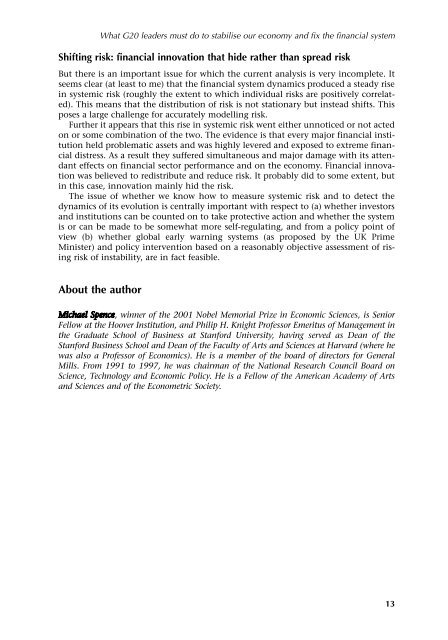What G20 Leaders Must Do To Stabilise our Economy and Fix ... - Vox
What G20 Leaders Must Do To Stabilise our Economy and Fix ... - Vox
What G20 Leaders Must Do To Stabilise our Economy and Fix ... - Vox
You also want an ePaper? Increase the reach of your titles
YUMPU automatically turns print PDFs into web optimized ePapers that Google loves.
<strong>What</strong> <strong>G20</strong> leaders must do to stabilise <strong>our</strong> economy <strong>and</strong> fix the financial systemShifting risk: financial innovation that hide rather than spread riskBut there is an important issue for which the current analysis is very incomplete. Itseems clear (at least to me) that the financial system dynamics produced a steady risein systemic risk (roughly the extent to which individual risks are positively correlated).This means that the distribution of risk is not stationary but instead shifts. Thisposes a large challenge for accurately modelling risk.Further it appears that this rise in systemic risk went either unnoticed or not actedon or some combination of the two. The evidence is that every major financial institutionheld problematic assets <strong>and</strong> was highly levered <strong>and</strong> exposed to extreme financialdistress. As a result they suffered simultaneous <strong>and</strong> major damage with its attendanteffects on financial sector performance <strong>and</strong> on the economy. Financial innovationwas believed to redistribute <strong>and</strong> reduce risk. It probably did to some extent, butin this case, innovation mainly hid the risk.The issue of whether we know how to measure systemic risk <strong>and</strong> to detect thedynamics of its evolution is centrally important with respect to (a) whether investors<strong>and</strong> institutions can be counted on to take protective action <strong>and</strong> whether the systemis or can be made to be somewhat more self-regulating, <strong>and</strong> from a policy point ofview (b) whether global early warning systems (as proposed by the UK PrimeMinister) <strong>and</strong> policy intervention based on a reasonably objective assessment of risingrisk of instability, are in fact feasible.About the authorMichael Spence, winner of the 2001 Nobel Memorial Prize in Economic Sciences, is SeniorFellow at the Hoover Institution, <strong>and</strong> Philip H. Knight Professor Emeritus of Management inthe Graduate School of Business at Stanford University, having served as Dean of theStanford Business School <strong>and</strong> Dean of the Faculty of Arts <strong>and</strong> Sciences at Harvard (where hewas also a Professor of Economics). He is a member of the board of directors for GeneralMills. From 1991 to 1997, he was chairman of the National Research Council Board onScience, Technology <strong>and</strong> Economic Policy. He is a Fellow of the American Academy of Arts<strong>and</strong> Sciences <strong>and</strong> of the Econometric Society.13














